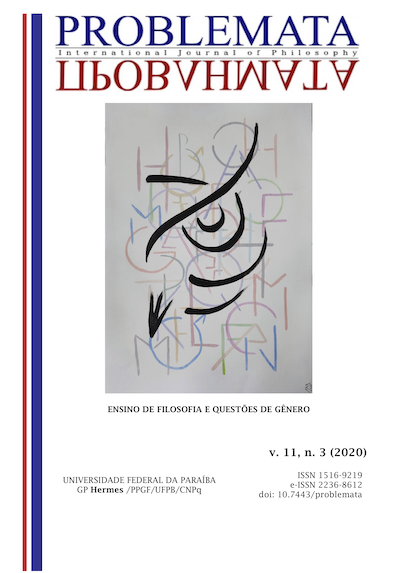HOW MANY ARE WE? WHERE ARE WE?
A LOOK AT PERFORMANCE OF GRADUATED WOMEN PHILOSOPHERS IN BRAZIL BETWEEN YEARS 2000 AND 2016
DOI:
https://doi.org/10.7443/problemata.v11i3.54199Keywords:
Brazilian women philosophers, University education, Professional performanceAbstract
Empirically, it is noticeable that the philosophy carried out in Brazil is notably masculine due to the majority presence of men in education and in the labor market. There is very little research on this situation and this fact is largely due to the difficulty of collecting and crossing data. In 2017/2018, I took part in a professional team that was respondibl to prepare ENADE’s Evidence Technical Report and other sources – changes in the profile of the graduated philosophers, published by the Cesgranrio Foundation. For the preparation of this document, data from INEP, CAPES, IBGE and the socio-economic profile of ENADE graduates (2004 to 2014) were used. It had made visible the evolution in the offer of undergraduate degrees in Philosophy, from 2000 to 2016, based on the number of courses offered in the universities, considered different categories, and also the advance of the presence of the genders at those institutions. It also reported on the professional performance of the graduates and on the average income by occupation groups and gender. So, the aim of this paper is to present data on the advance of the distribution of the genders in undergraduate courses between 2000 and 2015 and on the professional performance of women graduating from these courses and graduate courses; and comment on them from the perspective of the relationship between philosophy and gender, in order to contribute to the understanding of how the female presence is found in professional philosophy held in Brazil, with regard to training and professional performance.
Downloads
References
ALCOFF, Linda M. What’s wrong with philosophy?. The New York Times, New York, 03 set. 2013. Disponível em: http://opinionator.blogs.nytimes.com Acesso em: 23 abr 2017
ANPOF. Papo Feminista Carolina de Araújo. Disponível em: https://anpof.org/portal/index.php/pt-BR/2014-01-07-15-22-21/entrevistas/1100-bate-papo-feminista-carolina-de-araujo-ufrj Acesso em: 09 mar. 2017
ARAÚJO, Carolina de. Mulheres na Pós-Graduação em Filosofia no Brasil -¬2015. Disponível em: http://anpof.org/portal/images/Documentos/ARAUJOCarolina_Artigo_2016.pdf>. Acesso em: 10 jan. 2017
BELTRÃO, Kaizô W., MANDARINO Mônica. Evidências do ENADE – mudanças no perfil do matemático graduado. Ensaio: aval. pol. públ. Educ., Rio de Janeiro, v.22, n. 84, p. 733-754, jul./set. 2014
BELTRÃO, Kaizô W., WILKE, Valéria. PEDROSA, Mônica G. Evidências do ENADE e de outras fontes – mudanças no perfil do filósofo graduado: Relatório Técnico nº 04/2018. Rio de Janeiro: Fundação Cesgranrio, 2018
CASTRO, Susana, RODRIGUES, Carla. As mulheres ou “os silêncios” da história na Filosofia. Coluna da ANPOF. Disponível em: http://anpof.org/portal/index.php/en/comunidade/coluna-anpof/1099-as-mulheres-ou-os-silencios-da-historia-da-Filosofia>. Acesso em 08 mar 2017
DOMINGUES, Ivan. Filosofia no Brasil: Legados & perspectivas ensaios metafilosóficos. São Paulo: UNESP, 2017
______. Filosofia no Brasil: os últimos cinquenta anos – desafios e legados. Analytica, Rio
de Janeiro, v. 17, n. 2, 2013
FERREIRA, Maria Luísa Ribeiro. As Mulheres na Filosofia. Lisboa: Colibri, 2009
LIMONGI, Maria Isabel. A Filosofia e a desigualdade de gênero. Coluna da ANPOF. Disponível em: https://anpof.org/portal/index.php/en/comunidade/coluna-anpof/981-a-Filosofia-e-a-desigualdade-de-genero Acesso em: 09 nov. 2016
MARGUTTI, Paulo. Sobre a nossa tradição exegética e a necessidade de uma reavaliação do ensino de Filosofia no país. Kriterion, Belo Horizonte, n. 129, p. 397-410, jun/Ago, 2014
MARQUES, Fabrício. Corredor estreito. Revista FAPESP, São Paulo, n. 252, p. 32-35, fev. 2017. Disponível em: https://revistapesquisa.fapesp.br/wp-content/uploads/2017/02/032-035_MulheresnaFilosofia_252.pdf> Acesso em: 04 abr. 2017
PACHECO, Juliana (org.). Mulher & Filosofia: as relações de gênero no pensamento filosófico. Porto Alegre; Editora Fi, 2015
PUGLIESE, Nastassja. Filosofia, substantivo feminino. Coluna da ANPOF. Disponível em:
https://anpof.org/portal/index.php/es-ES/comunidade/coluna-anpof/2500-Filosofia-substantivo-feminino>. Acesso em 09 mar 2020
INEP. Censo Escolar 2017: notas estatísticas. Disponível em: http://download.inep.gov.br/educacao_basica/censo_escolar/notas_estatisticas/2018/notas_estatisticas_Censo_Escolar_2017.pdf Acesso em: 28 jan. 2018
______. Resumo Técnico: Censo da Educação Básica 2018. Disponível em: http://download.inep.gov.br/educacao_basica/censo_escolar/resumos_tecnicos/resumo_tecnico_censo_educacao_basica_2018.pdf Acesso em o3 de fev. 2019
RAMOS, Silvana de S. Precisamos falar sobre assédio, sim: entrevista concedida à Nádia Ribeiro. Rede Brasileira de Mulheres Filósofas. 09 dez. 2019. Disponível em:
https://www.filosofas.org/forum/assedio-1/precisamos-falar-sobre-assedio-sim Acesso em 12 dez 2019
RODRIGUES, Carla. A Filosofia (brasileira) não é feita só por homens. Coluna da ANPOF. 22 dez. 2016. Disponível em: https://anpof.org/portal/index.php/es-ES/comunidade/coluna-anpof/1033-a-Filosofia-brasileira-nao-e-feita-so-por-homens. Acesso em 23 dez 2016
______. Mulheres que pensam e fazem pensar. Coluna da ANPOF. 24 jun. 2019. Disponível em: https://anpof.org/portal/index.php/pt-BR/comunidade/coluna-anpof/2183-mulheres-que-pensam-e-fazem-pensar>. Acesso em: 25 jun 2019
ROSA, Graziela R. da. As relações de gênero na Filosofia: vivências e narrativas de professoras de Filosofia. São Leopoldo, 2006. Dissertação (Mestrado em Educação) – Universidade do Vale do Rio os Sinos, São Leopoldo, 2006
TIBURI, Marcia. “As mulheres e a filosofia como ciência do esquecimento”. In. Com Ciência, Campinas, dez. 2003. Disponível em: http://www.comciencia.br/reportagens/mulheres/15.shtml Acesso em: 22 mai 2004
Downloads
Published
Issue
Section
License
Authors who publish with this journal agree to the following terms:
- Authors retain copyright and grant the journal right of first publication with the work simultaneously licensed under a Creative Commons Attribution License that allows others to share the work with an acknowledgement of the work's authorship and initial publication in this journal.
- Authors are able to enter into separate, additional contractual arrangements for the non-exclusive distribution of the journal's published version of the work (e.g., post it to an institutional repository or publish it in a book), with an acknowledgement of its initial publication in this journal.
-
- Authors are permitted and encouraged to post their work online (e.g., in institutional repositories or on their website) prior to and during the submission process, as it can lead to productive exchanges, as well as earlier and greater citation of published work (See The Effect of Open Access).





